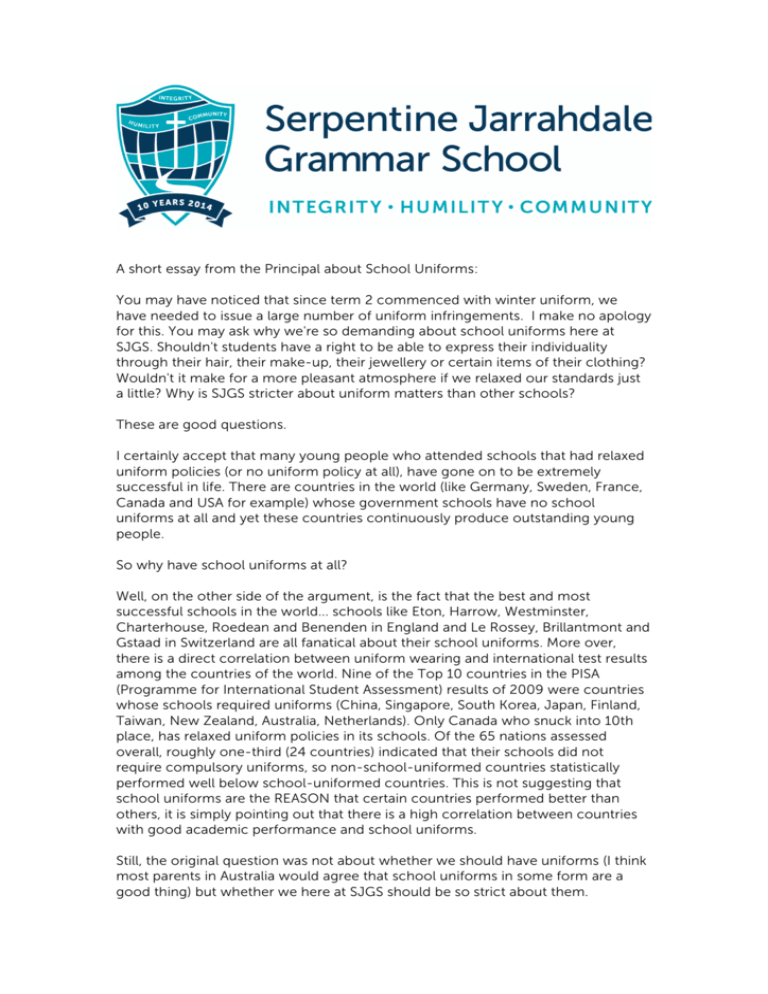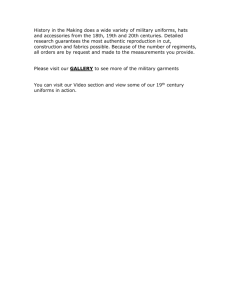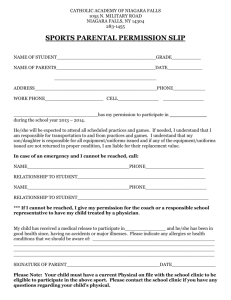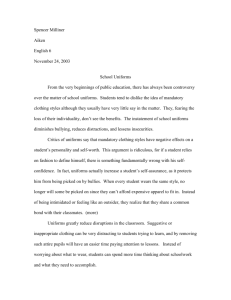A short essay from the Principal about School Uniforms
advertisement

A short essay from the Principal about School Uniforms: You may have noticed that since term 2 commenced with winter uniform, we have needed to issue a large number of uniform infringements. I make no apology for this. You may ask why we're so demanding about school uniforms here at SJGS. Shouldn't students have a right to be able to express their individuality through their hair, their make-up, their jewellery or certain items of their clothing? Wouldn't it make for a more pleasant atmosphere if we relaxed our standards just a little? Why is SJGS stricter about uniform matters than other schools? These are good questions. I certainly accept that many young people who attended schools that had relaxed uniform policies (or no uniform policy at all), have gone on to be extremely successful in life. There are countries in the world (like Germany, Sweden, France, Canada and USA for example) whose government schools have no school uniforms at all and yet these countries continuously produce outstanding young people. So why have school uniforms at all? Well, on the other side of the argument, is the fact that the best and most successful schools in the world... schools like Eton, Harrow, Westminster, Charterhouse, Roedean and Benenden in England and Le Rossey, Brillantmont and Gstaad in Switzerland are all fanatical about their school uniforms. More over, there is a direct correlation between uniform wearing and international test results among the countries of the world. Nine of the Top 10 countries in the PISA (Programme for International Student Assessment) results of 2009 were countries whose schools required uniforms (China, Singapore, South Korea, Japan, Finland, Taiwan, New Zealand, Australia, Netherlands). Only Canada who snuck into 10th place, has relaxed uniform policies in its schools. Of the 65 nations assessed overall, roughly one-third (24 countries) indicated that their schools did not require compulsory uniforms, so non-school-uniformed countries statistically performed well below school-uniformed countries. This is not suggesting that school uniforms are the REASON that certain countries performed better than others, it is simply pointing out that there is a high correlation between countries with good academic performance and school uniforms. Still, the original question was not about whether we should have uniforms (I think most parents in Australia would agree that school uniforms in some form are a good thing) but whether we here at SJGS should be so strict about them. The simple answer has to do with 'choice'. Australia's education policy is based on the notion of providing choice. Parents can choose to have their children educated at a local government school or at a private school, whether it be a religious school or an independent school like Serpentine Jarrahdale Grammar School. Each school or school system offers parents a different choice. Part of the 'choice' offered by schools involves their attitude to school uniforms. Some schools are more relaxed about uniform policy and some (like SJGS) are far more strict and uncompromising about dress codes and uniforms. It is not compulsory to attend SJGS, but if you choose to come here (or educate your children here) there is a price to pay. SJGS is not an expensive private school, but it demands the highest price of its students in terms of attitude, discipline, work ethic and respect for authority. An important measure of this attitude, discipline and respect for authority is how well our students accept our rules and regulations regarding our school uniform. Okay ... so WHY is SJGS so strict about how our students wear their uniform? Here are my TOP 10 REASONS for being strict about our school uniform... 1 • DEMONSTRATING RESPECT FOR AUTHORITY : it's NOT just about obeying rules that are convenient or that you happen to agree with, it's about obeying rules because of a sense of duty and responsibility. The fact that many children these days might find our uniform standards difficult to uphold is part of the justification for setting them so high in the first place... i.e. to build character and demonstrate that you are prepared to accept the right of others to set rules for you even if you don't necessarily agree with or like those rules. It would NOT be demonstrating your respect for authority if the rules being set by that authority were too easy to uphold. 2 • BUILDING THE REPUTATION OF THE SCHOOL : all students of a school benefit when their school enjoys an excellent reputation within the community. This good reputation translates into improved employment prospects for our students as prospective employers know that as a Serpentine Jarrahdale Grammar School student you have demonstrated a respect for authority and a sense of duty and responsibility to your school that transcends your own wants and desires. These are considered highly desirable and attractive job-seeker characteristics by employers. 3 • HELPING TO ACQUIRE REAL VALUES AND MORE PRODUCTIVE WAYS TO EXPRESS ONE'S INDIVIDUALITY : Anyone who bases their own self-esteem (or their value-judgments of others) on how cool they look (the designer clothes they wear, the stylish hair or popular fashion they are capable of displaying, etc) is at serious risk of failing to learn one of adolescence's most valuable lessons... that what makes us unique as individuals is not whether we can spike up our hair or hang our pants low (like a million other high school students in Australia) but more about the values we live our lives by, how we help and respect others, what we write, what we read, what we believe are important aspects of life and how we communicate our opinions to others, what our unique strengths and weaknesses are, etc. In other words, by removing the option of expressing their individuality through their physical appearance, we are forcing our students to explore other (hopefully more productive) ways of expressing individuality and at the same time, hopefully helping them to learn to judge others not by their superficial appearance but by an individual's actions, words, values and unique personal qualities. To some this might seem a little confusing... if the school is saying that we should NOT judge others by how they look, then why is the school asking its students to 'look' a particular way? Because the way WE are asking our students to look is specifically designed to demonstrate something much more important about them than their taste in clothes or their ability to follow fashion trends or the financial status of their family ... its demonstrating a respect for authority, a sense of duty and responsibility and a sense of pride in their school ... these are REAL values, because it demands much more of the wearer than access to the specific clothes ... it demands a commitment of purpose, attitude and values. In other words, our school uniform is designed to allow you to demonstrate many important characteristics about yourself (your respect for authority, your sense of duty and responsibility, your time management and organisational skills in preparing your uniform daily, your pride in your school, etc) but it is NOT designed to allow you to express your individuality. We think this is a good thing because it forces you to explore other (more productive) ways to express your individuality. Since you won't learn much about your classmate's individuality by looking at their uniforms either, it will also force you to explore more deeply into your classmates to discover their unique characteristics. 4 • LEARNING TO BE SUCCESSFUL WITHIN THE RULES OF THE GAME : Often when interviewing potential parents and students we explain our high standard of dress code as if it were a game that we're playing (because essentially it IS just a game we're playing). If while playing a game of football you kick the ball out on the full and the referee blows the whistle, you know that it's a total waste of time to question the rule and complain to the referee: 'What a stupid rule ... why aren't I allowed to kick the ball out on the full?' Similarly, there would be little point in suggesting to the referees that they should be a little more 'relaxed' with the rules... 'It didn't go THAT far out, why are you so strict?' or 'Hey it was an accident, I didn't MEAN to kick it out on the full. No. Everyone playing sports knows that their objective is to be successful WITHIN THE RULES OF THE GAME. In sport, as in life and work, there's no point complaining about the rules. If you believe them to be unfair, illogical, unsafe, etc, then you should discover the proper process to appeal or amend the rule and try to change it officially. Otherwise your mission is to be successful while abiding by the rules of the environment you find yourself in. If however, our students learn the habit of breaking, bending or avoiding rules here at school, it will be a hard habit to break when they get out into the real world and find that the penalty for such infringements can be much higher than a school infringement notice. 5 • LEARNING THE DIFFERENCE BETWEEN PRIDE AND VANITY : Forbes suggests that worldwide, the most common characteristic of successful enterprises is 'a shared pride in the organisation'. Sporting teams win competitions because of their pride and self-belief. Armies have won wars simply because they had stronger pride and self-belief than their enemies. Pride in your group, your company, your team, your school ... these are unquestionably good things. There is a massive difference however, between having a healthy pride in the achievements of one's group (on one hand) and an individual being personally proud of themselves (on the other). Self-pride is called arrogance or conceit and is considered the worst of the seven deadly sins (along with wrath, greed, sloth, lust, envy and gluttony incase you were interested.) If the focus of one's conceit or pride is their physical appearance, it's called 'vanity'. 'Self-pride' is defined as: 'a desire to be more important or attractive than others; failing to acknowledge the good work of others.' Our basic ethos here at SJGS is to build the right kind of pride... a pride in the achievements of our school, a respect for its uniform and culture and a self-belief based on the notion that we are capable of being as good as (but not better than) anyone else on the planet. We also want to deter our students from being conceited or vain. We believe therefore that conforming to our school uniform not only demonstrates respect and pride in our school but it also demonstrates that our students do not have a desire to feel more important or attractive than others. 6 • GETTING YOUR PRIORITIES RIGHT : There is evidence to suggest that without school uniforms and a strict, conforming dress code, some students will spend more time and energy focusing on their clothes/make-up/jewellery, etc, than the things that are actually important in education... i.e. gaining qualifications, knowledge, skills, positive characteristics, a strong work ethic, good habits and attitudes, etc. I appreciate that perhaps only a minority of students would fall into this category, but strict rules of conformity will discourage even that small minority from wasting their time on unimportant 'personal fashion' issues at school. 7 • LEARNING A SIMPLE LESSON - WHO ARE WE SUPPOSED TO BE IMPRESSING? Following on from the previous point, it is disappointing when we see students whose objective at school is to impress their peers by appearing 'cool' or attractive. They are demonstrating that they have failed to work out WHO they're supposed to be trying to impress here. Unless we can persuade them that they are supposed to be trying to impress their teachers, they are likely to continue this misguided behaviour into their future work-places and then wonder why they are continually passed over for promotion or laid-off. A strict dress code helps to remind our students who they are supposed to be trying to impress. 8 • HABITS ARE CONTAGIOUS AND EASILY TRANSFERRED: Conforming to a strict dress code is not always easy, but the more one does it, the easier it gets because it simply becomes a habit. Making sure that one's uniform is clean and ready each morning, requires responsibility, preparation and time management skills, which again become easier once they become habitual. When a student gets into a nightly routine to ensure their uniforms are prepared, they will find it relatively easy to extend this routine into homework preparation and study. The point is that good habits are something we want to encourage and instill into our students here at SJGS, and forcing our students to commit to a regular schedule for uniform preparation gets them heading in the right direction. 9 • UNIFORMS - YOU EITHER DO THEM RIGHT OR NOT AT ALL: At the risk of over-simplification, you either have a uniform or you don't. As the word implies... we are all supposed to look uniform, i.e. consistent, as one. From the Latin: unus (singular) and forma (form or appearance). Furthermore, once you start to divert in any way from the school's uniform, it's a slippery slope... if you accept any latitude in the definition of one rule, in fairness you have to start doing the same for other rules and before you know it, instead of a uniform you have a suggested or recommended code of dress which becomes open to everyone's interpretation, is impossible to manage and achieves NONE of the eight objectives previously outlined. I have absolutely no problem with (in fact I would encourage) our students lobbying to have a specific aspect of our school uniform officially changed. (The point is that it would be changed for everyone and still remain a strictly conformed-to uniform.) What I have no interest in, is allowing individual students or even groups of students to alter the uniform for their own personal benefit or interest. 10 • THEY LOOK MAGNIFICENT: At SJGS we are accustomed to people telling us how brilliant our students look in their school uniforms. Why would anyone want to change that? OTHER LESS IMPORTANT REASONS: A conforming uniform helps to reduce distractions in class, since there is nothing particularly interesting being worn by your classmates to attract your attention or discuss AND it helps to foster a sense of identity for our 'organisation' AND from a safety and security perspective it allows us to immediately identify someone who shouldn't be on campus, even if they have somehow found parts of our uniform, they are unlikely to know how to wear it correctly. Adrian Scott Principal (With thanks to Geoff Mills for ideas and content)





